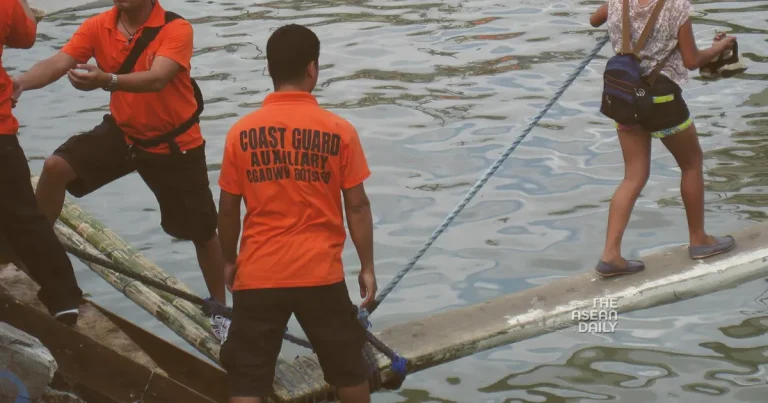9-4-2024 (MANILA) An unsettling disclosure by the Philippine Coast Guard has sparked concerns about potential espionage amidst escalating maritime tensions between Manila and Beijing. Admiral Ronnie Gil Gavan, the Coast Guard’s top official, revealed last month that the agency’s civilian volunteer wing, the Philippine Coast Guard Auxiliary (PCGA), shockingly had 36 Chinese nationals actively serving on its roster.
Addressing lawmakers, Gavan assured that these individuals had been “delisted” and posed no threat to national security. However, irate congressmen fervently demanded severe repercussions, labelling the situation as “treasonous”. The PCGA is regarded as the Philippine Coast Guard’s “secret weapon”, often engaged in daring missions to resupply a military outpost on the disputed Second Thomas Shoal in the contentious South China Sea region while evading Chinese vessels.
Observers and sources familiar with the matter informed This Week in Asia that uneven recruitment protocols, potential self-interest in boat ownership, and past shifts in foreign policy toward China may have enabled the enrolment of these Chinese nationals into the PCGA’s ranks.
At a hearing on March 20th, Gavan, who assumed his post last October, elucidated, “We conducted an investigation, consulting intelligence and national security agencies. We have delisted 36 of them. We evaluated their compliance with established standards, and upon finding violations, we initiated their delisting. They are now no longer members.”
Gavan clarified that volunteers were accepted into the PCGA “provided they secured national security clearance”. However, Congressman Robert “Ace” Barbers remained deeply troubled, questioning, “Are foreigners like the Chinese, especially the Chinese, allowed to become members of our coastguard’s auxiliary force? These Chinese served as auxiliary members for two, three years… They may be performing spying duties under the guise of being auxiliary force members.”
A maritime industry insider, speaking anonymously, revealed to This Week in Asia that the PCGA has existed for over 50 years, dating back to the rule of Ferdinand Marcos Sr. At that time, the source explained, Filipino and foreign yacht owners encountered difficulties registering their vessels locally due to regulations treating yachts and 20,000-tonne tankers identically, incurring exorbitant costs and taxes.
“That’s why boat owners would register with the PCGA,” the source said, “because then they could paint a number on their boat that warned the Coast Guard they were a member of the auxiliary.” This was primarily to prevent extortion, the source alleged, accusing the PCG of corruption and hiring terminated police officers.
The source speculated that joining the PCGA might have involved “basically buying their admiralty rank for a fee”, with donations funding the new recruit’s squadron programmes. However, PCG spokesman Rear Admiral Armand Balilo dismissed claims of dismissed policemen being hired, stating it was his first time hearing such allegations.
In 2019, according to a news release, the then PCG commandant Joel Garcia swore in 110 former police and military personnel who had been “separated with honour”.
Today, the PCG serves a dual role as an armed, uniformed civilian agency that reports to the Department of Transportation and Communications during peacetime, and to the Defence Secretary during wartime.
The Coast Guard Law, revised in 2009, officially recognised the PCGA as “a civilian volunteer organisation under the direct control and supervision of the PCG Commandant”, tasked with assisting in maritime safety, environmental preservation, search and rescue operations, navigational aid maintenance, and community outreach.
Balilo told This Week in Asia that foreigners, including Chinese nationals recommended by Filipino-Chinese businessmen, have long been PCGA members, some for over 20 years. These Chinese volunteers joined the Executive Squadron and Civil Relation Service Special Support Squadron, with the Executive Squadron purportedly comprising prominent personalities like politicians and government officials.
“The Chinese submitted police clearance, National Bureau of Investigation clearance, and I think passports showing [Bureau of Immigration] clearance,” Balilo stated. He stressed their participation was limited to civic actions like relief goods donation and medical missions, with no access to restricted PCG areas or involvement in operations.
However, when the new PCG Commandant Gavan imposed an additional national security clearance requirement, the mainlanders were apparently unable to comply, leading to their delisting.
“We are very strict insofar as security is concerned,” Balilo affirmed, adding there was “no strong basis” to accuse them of spying, and no PCGA involvement in recent PCG social media hacking incidents.
Businessman Rafal “Apa” Ongpin, former president of the Manila Boat Club, saw no issue with foreigners, including Chinese, joining the PCGA, likening it to “no different from a rotary club”.
The influx of Chinese members into the PCGA could also be attributed to former president Rodrigo Duterte’s pivot toward China. During his 2016 Beijing visit, Duterte committed to enhancing coastguard cooperation with President Xi Jinping, leading to proposals for a direct hotline and a Philippine coastguard attaché in Beijing. However, the latter was rejected in 2020 by then Foreign Secretary Teodoro Locsin Jr., warning it could imply conceding sovereignty over coastal waters.




